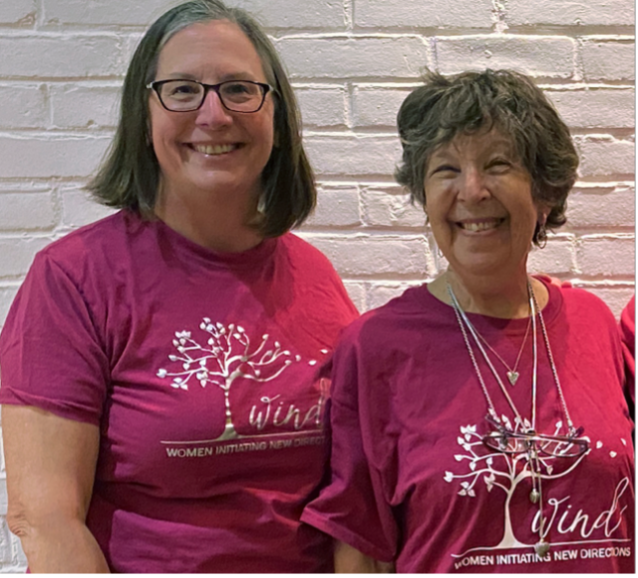This week, we interviewed Penny Hirsch, a founding board member of WIND, who spoke with us about the organization’s mission, her passion for helping justice-involved women, and future WIND plans.
Crossing Societal Divides: WIND’s Mission and Impact
Penny’s journey with WIND began with her enthusiasm for the organization’s mission of supporting formerly incarcerated women. As she puts it, “WIND’s work primarily reaches women from disadvantaged communities, many of whom are poor women of color, mothers and grandmothers. They have so much to offer society when they are given more opportunities.” Penny helped to develop WIND’s core courses, devoting most of her attention to Writing for Empowerment.
WIND has evolved over the years. In addition to their four core courses, WIND runs a diverse array of workshops covering topics such as “Journaling to Find the Love You Deserve,” “Healing through Humor,” “Taking Care of Your Lady Parts,” and “Money Matters.” Penny believes that WIND’s workshops extend beyond offering learning opportunities for participants; the workshops also provide mutual exchanges of compassion, knowledge, and wisdom: “Those of us who work with WIND benefit as much from our participants’ wisdom and lived experience as they say they benefit from ours.”
One of WIND’s most important additions is the Bridge Program, designed to assist “system-impacted women in developing facilitation and leadership skills.” She works closely with graduates of Bridge, helping them to become co-facilitators in Writing for Empowerment. Some Bridge graduates become WIND’s “Lived Experience Leaders” (LELs); as they participate in WIND workshops, they receive a stipend, additional training and credentials for their resumes.
For Penny, WIND is more than an organization – it’s an opportunity to transcend boundaries. As she aptly says: “Being in WIND is a chance to cross societal divides.”
Healing through Words: Writing for Empowerment
Initially Penny played a role in all of WIND’s core courses, especially when the onset of the Covid-19 pandemic led to the cancellation of in-person workshops and WIND had to rely on zoom. But this was especially difficult for the writing courses which she had always led at Grace House in person. Writing courses over zoom were less successful. As a result, Penny and co-founder Kelly Costello, designed innovative correspondence workshops for women incarcerated in Cook County Jail.
Penny explains, “We worked with a professor and several graduate students at the Illinois Institute of Technology to modify the WIND curricula to ensure that the remote courses would be engaging, and then we worked with a wonderful program sheriff at Cook County to implement the new courses.”
These remote courses have been a huge success and will continue to be offered. Penny elaborates: “I run the writing courses twice a year for about 20 women in each course. Each participant is paired with a volunteer feedback coach so each woman writer receives individual attention throughout the course. Writing for Empowerment focuses on helping women heal from the past, develop self-confidence, and imagine new paths for their futures.” Penny looks forward to 2024, when a revamped in-person version of Writing for Empowerment will be introduced at Grace House. This iteration, developed by two of our fabulous volunteers, will focus on “freedom dreaming” and “collective storytelling.”
Beyond Workshops: A Platform for Change
The impact of WIND’s courses transcends the boundaries of the workshop. Penny shares, “WIND has accumulated wonderful poetry, artwork, reflective pieces and thank you notes from the women in our courses over the past four years. This work is moving and inspirational…We want to share it with a larger audience – women in transition homes, prisons and jail, and the public at large.” Indeed, Penny is currently collaborating with Angela Lopez, an intern from Adler University, to assemble an anthology of the women’s poetry, artwork, and reflective pieces from WIND courses. This will be released in early 2024!
Beyond storytelling, Penny reflects on one of her favorite aspects of working with WIND: collaborating with WIND’s student volunteers and interns. She asserts: “They are the future, and WIND gives them an opportunity to meet the women being incarcerated in the U.S., who, in most cases, would benefit more from health care, social work, and education than imprisonment.” WIND remains committed to its mission, nurturing a vision where incarcerated women find healing, support, and opportunities for growth beyond confinement.

